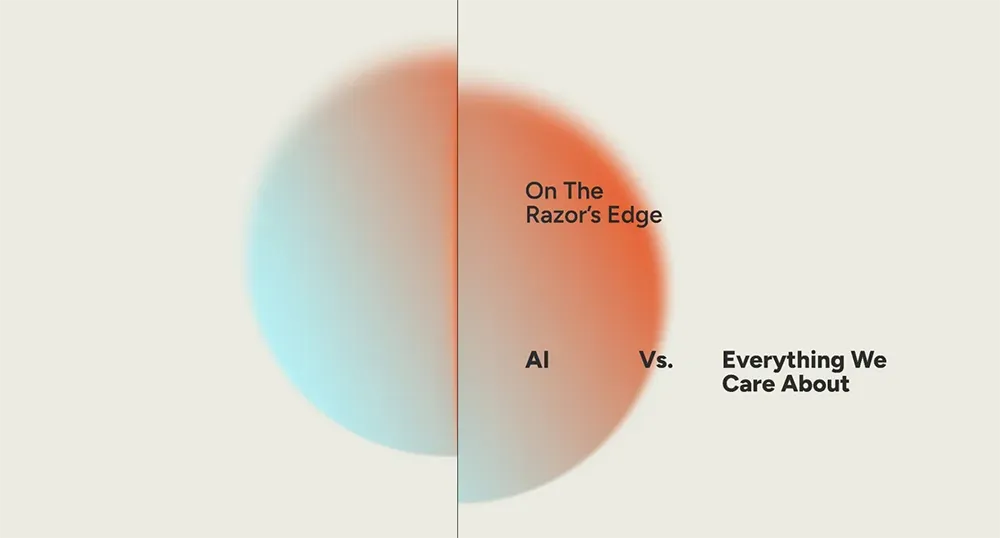An Innovation Futurist's Role in Understanding Nanotechnology

An Innovation Futurist's Role in Understanding Nanotechnology
Nanotechnology is revolutionizing the world as we know it, expanding the frontiers of scientific discovery and technological innovation. At the forefront of this fascinating field are the innovation futurists, individuals with a unique blend of visionary thinking and scientific expertise. Their role in understanding nanotechnology is paramount, as they unravel its complexities, explore its vast potential, and predict its impact on our lives.
Understanding the Basics of Nanotechnology
Before delving into the role of an innovation futurist, it is crucial to grasp the basics of nanotechnology. At its core, nanotechnology involves manipulating matter at the molecular and atomic level, allowing scientists to engineer materials with exceptional properties and functionalities. The applications of nanotechnology span a wide range of industries, from medicine and electronics to energy and environmental sustainability.
Nanotechnology operates on the nanoscale, which measures objects between 1 and 100 nanometers. To put that into perspective, a nanometer is one-billionth of a meter, roughly one hundred thousand times smaller than the thickness of a human hair. This reduction in scale brings about remarkable changes in material properties, such as increased surface area, enhanced conductivity, and improved strength.
One fascinating application of nanotechnology is in the field of medicine. Scientists are exploring the use of nanomaterials to develop targeted drug delivery systems. By encapsulating drugs within nanoparticles, they can be delivered directly to specific cells or tissues, increasing the effectiveness of treatment while minimizing side effects. Nanotechnology also holds promise in the development of diagnostic tools, such as biosensors that can detect diseases at an early stage by analyzing biomarkers at the molecular level.
In the electronics industry, nanotechnology has revolutionized the way we manufacture and design electronic devices. Nanoscale materials, such as carbon nanotubes and graphene, have exceptional electrical properties, making them ideal for creating faster and more efficient transistors. These nanomaterials also enable the development of flexible and transparent electronics, paving the way for innovative applications such as foldable smartphones and wearable devices.
Energy is another area where nanotechnology is making significant contributions. Nanomaterials are being used to improve the efficiency of solar cells, allowing them to convert sunlight into electricity more effectively. Additionally, nanotechnology is being employed to develop advanced energy storage systems, such as high-capacity batteries and supercapacitors. These advancements have the potential to revolutionize renewable energy sources and reduce our dependence on fossil fuels.
Furthermore, nanotechnology plays a crucial role in environmental sustainability. Nanomaterials are being used to develop efficient water purification systems, capable of removing contaminants at the molecular level. These nanofilters can remove pollutants, bacteria, and viruses, providing clean and safe drinking water in areas with limited access to clean water sources. Nanotechnology is also being explored for applications in air pollution control, waste management, and sustainable agriculture.
As our understanding of nanotechnology continues to grow, so does its potential for innovation and impact across various industries. The ability to manipulate matter at the nanoscale opens up endless possibilities for creating new materials, improving existing technologies, and addressing pressing global challenges. Whether it's in medicine, electronics, energy, or the environment, nanotechnology is shaping the future and paving the way for a more advanced and sustainable world.
Role of an Innovation Futurist in Decoding Nanotechnology
Now that we have a foundation of understanding, let's explore the role of an innovation futurist in decoding nanotechnology. These forward-thinking individuals navigate the complexities of this rapidly evolving field, bridging the gap between scientific discovery and practical implementation.
An innovation futurist begins by staying abreast of the latest scientific research and breakthroughs in nanotechnology. They analyze the potential applications of these advancements across various industries, seeking out opportunities for innovation and progress. By closely monitoring trends and developments, innovation futurists can accurately predict the trajectory of nanotechnology and its potential impact on society.
But what exactly does it mean to be an innovation futurist in the context of nanotechnology? It entails more than just keeping up with the latest news and developments. It requires a deep understanding of the underlying principles and concepts that govern nanotechnology. Innovation futurists immerse themselves in the world of nanoscale science and engineering, studying the behavior of materials at the atomic and molecular level.
By delving into the intricacies of nanotechnology, innovation futurists can identify potential challenges and roadblocks that may hinder its widespread adoption. They anticipate the ethical, social, and environmental implications of nanotechnology, ensuring that its implementation aligns with the values and needs of society. Through their comprehensive understanding, innovation futurists guide the responsible development and deployment of nanotechnology.
Furthermore, innovation futurists play a crucial role in translating complex scientific concepts into accessible language. They act as interpreters, breaking down the jargon and making nanotechnology understandable to the wider public. Through their communication skills, innovation futurists bridge the gap between scientists, policymakers, and the general public, fostering an informed and engaged society.
But their role goes beyond mere translation. Innovation futurists also serve as ambassadors for nanotechnology, advocating for its potential benefits and dispelling misconceptions. They engage in public outreach and education, organizing workshops, seminars, and conferences to raise awareness and promote dialogue. By demystifying nanotechnology, innovation futurists empower individuals and communities to actively participate in shaping its future.
Moreover, innovation futurists collaborate with multidisciplinary teams to drive innovation and foster cross-pollination of ideas. They bring together scientists, engineers, designers, and entrepreneurs to explore the possibilities of nanotechnology in diverse fields such as healthcare, energy, electronics, and materials science. Through these collaborations, innovation futurists catalyze the development of groundbreaking technologies and solutions that have the potential to revolutionize industries and improve lives.
In conclusion, the role of an innovation futurist in decoding nanotechnology is multifaceted. They are the visionaries who navigate the complexities of this field, predicting its trajectory and identifying opportunities for innovation. They are the communicators who bridge the gap between scientists, policymakers, and the public, making nanotechnology accessible and fostering an informed society. And they are the catalysts who drive collaboration and innovation, leading the way towards a future powered by nanotechnology.
Potential Benefits and Applications of Nanotechnology
The potential benefits of nanotechnology are vast and far-reaching. By manipulating matter at the nanoscale, innovation futurists envision a future where we have safer and more efficient medical treatments, sustainable and renewable energy sources, and advanced electronics that far surpass our current capabilities.
In the field of medicine, nanotechnology holds the promise of targeted drug delivery, personalized medicine, and early disease detection. Imagine a world where cancer cells can be specifically targeted and destroyed, or where tiny nanobots navigate through our bloodstream to repair damaged cells. These breakthroughs have the potential to revolutionize healthcare as we know it.
But the potential of nanotechnology doesn't stop there. Researchers are also exploring the use of nanomaterials in tissue engineering and regenerative medicine. By engineering scaffolds at the nanoscale, scientists hope to create artificial organs and tissues that can seamlessly integrate with the human body, offering new hope to patients in need of transplants or suffering from organ failure.
Moreover, nanotechnology has the potential to transform the field of diagnostics. With the development of nanosensors, doctors may be able to detect diseases at their earliest stages, even before symptoms manifest. These sensors, capable of detecting biomarkers and other disease indicators, could revolutionize the way we approach preventive medicine, allowing for early intervention and more effective treatment.
When it comes to energy, nanotechnology paves the way for more efficient solar panels, lightweight and powerful batteries, and highly efficient energy storage systems. With nanomaterials, we can develop light-emitting diodes (LEDs) that consume less energy while providing brighter illumination, reducing our carbon footprint and contributing to a more sustainable future.
But the potential of nanotechnology in the energy sector goes beyond renewable sources. Researchers are also exploring the use of nanomaterials in improving the efficiency of fossil fuel extraction and refining processes. By designing nanocatalysts, scientists hope to enhance the efficiency of chemical reactions involved in oil and gas production, reducing waste and minimizing environmental impact.
Furthermore, nanotechnology offers exciting possibilities in the field of electronics. With the miniaturization of electronic components, we can expect faster and more powerful computers, smaller and more efficient smartphones, and wearable devices that seamlessly integrate with our daily lives. Nanoelectronics also opens the door to flexible and transparent electronics, enabling the development of flexible displays, smart clothing, and even electronic tattoos.
But the potential of nanotechnology in electronics doesn't end there. Researchers are also exploring the use of nanomaterials in quantum computing, a revolutionary technology that promises to solve complex problems at an unprecedented speed. By harnessing the unique properties of nanoparticles, scientists aim to create quantum bits, or qubits, that can store and process information in ways that surpass the capabilities of classical computers.
How Innovation Futurists Predict the Impact of Nanotechnology
As innovation futurists strive to understand nanotechnology, they also focus on predicting its impact on various aspects of our lives. By analyzing current trends, studying historical precedents, and drawing on their expertise, these futurists paint a conceivable picture of the future.
By envisioning different scenarios and possibilities, innovation futurists provide invaluable insights to policymakers, businesses, and individuals. They empower decision-makers with the necessary knowledge to navigate potential risks and seize opportunities. Through their interdisciplinary perspectives, innovation futurists help to shape policies, guide investments, and inspire entrepreneurs.
One area where nanotechnology is expected to have a significant impact is in the field of medicine. Innovation futurists predict that nanotechnology will revolutionize healthcare by enabling targeted drug delivery, personalized medicine, and advanced diagnostic tools. Imagine a future where tiny nanobots navigate through our bloodstream, precisely delivering medication to specific cells or repairing damaged tissues. This level of precision could potentially eradicate diseases that were once considered incurable.
Furthermore, nanotechnology is anticipated to transform the energy sector. Innovation futurists envision a world where solar panels are not only more efficient but also incredibly lightweight and flexible, thanks to nanomaterials. These advancements could make renewable energy more accessible and affordable, leading to a significant reduction in greenhouse gas emissions and a more sustainable future.
Another area where nanotechnology holds great promise is in the realm of electronics. Innovation futurists predict that nanoscale transistors and circuits will enable the development of smaller, faster, and more powerful devices. Imagine smartphones that are not only thinner and lighter but also capable of processing information at unprecedented speeds. This could revolutionize communication, computing, and entertainment industries, opening up new possibilities for human interaction and technological advancement.
Moreover, innovation futurists anticipate that nanotechnology will play a crucial role in environmental conservation. By harnessing the unique properties of nanomaterials, scientists and engineers can develop innovative solutions for water purification, air filtration, and waste management. Nanoparticles with specific properties can be designed to remove pollutants from water sources, filter harmful particles from the air, and even break down hazardous waste materials into harmless byproducts.
As innovation futurists delve deeper into the potential impact of nanotechnology, they also consider the ethical and societal implications. They explore questions of privacy, security, and equity to ensure that the benefits of nanotechnology are accessible to all and do not exacerbate existing inequalities. By addressing these concerns proactively, innovation futurists contribute to the responsible development and deployment of nanotechnology.
In conclusion, innovation futurists play a crucial role in predicting the impact of nanotechnology. Through their analysis, foresight, and interdisciplinary approach, they provide valuable insights that help shape the future. From revolutionizing healthcare and energy to transforming electronics and environmental conservation, nanotechnology holds immense potential. By understanding and preparing for the possibilities, we can navigate the challenges and embrace the opportunities that nanotechnology brings.
Future Prospects of Nanotechnology
The future prospects of nanotechnology are boundless, with almost limitless potential waiting to be unleashed. As our understanding of nanoscale phenomena deepens, we can expect breakthroughs that will transform industries, solve pressing global challenges, and improve our quality of life.
Advances in nanotechnology will lead to increasingly powerful and efficient computing devices, unimaginable improvements in renewable energy generation and storage, and remarkable breakthroughs in healthcare and diagnostics. As innovation futurists decode nanotechnology, they pave the way for a future that is both awe-inspiring and practical.
Conclusion
As the world boldly ventures into the realm of nanotechnology, the role of innovation futurists becomes ever more critical. These visionaries help us navigate the complexities of this transformative field, bringing clarity and understanding to the forefront. Their unique blend of scientific expertise and visionary thinking allows us to embrace the vast potential of nanotechnology, shaping a future that is both enlightened and technologically advanced.
Frequently Asked Questions
What is nanotechnology and what are its applications?
Nanotechnology involves manipulating matter at the molecular and atomic level, allowing scientists to engineer materials with exceptional properties. Its applications span various industries, including medicine, electronics, energy, and environmental sustainability.
What is the role of an innovation futurist in understanding nanotechnology?
An innovation futurist has the task of decoding nanotechnology by staying updated on the latest research and breakthroughs. They analyze its potential applications, predict its trajectory, and identify opportunities for innovation. They also play a crucial role in translating complex scientific concepts into accessible language and fostering public awareness and engagement.
What are the potential benefits and future prospects of nanotechnology?
Nanotechnology offers vast benefits, such as targeted drug delivery in medicine, more efficient energy sources, and advanced electronics. Its future prospects include revolutionizing healthcare, transforming energy generation and storage, and solving global challenges. As our understanding deepens, nanotechnology holds immense potential for improving our quality of life.
Contact a Innovation Futurist for your event
Having delved into the fascinating world of nanotechnology and the pivotal role of an innovation futurist, why not bring this captivating expertise to your next event? Dr Mark van Rijmenam, a renowned innovation futurist, is ready to transport your audience into the exciting future of nanotechnology. With his unique blend of visionary thinking and in-depth scientific knowledge, Dr van Rijmenam will demystify the complexities of nanotechnology, and inspire your audience about its vast potential and impact on our lives. From healthcare and energy to electronics and environmental conservation, his insights will spark engaging discussions and stimulate innovative thinking. To hire Dr van Rijmenam as a speaker for your next event, simply complete the form below. We promise to be in touch within 24 hours, ready to discuss how we can make your event truly memorable.





